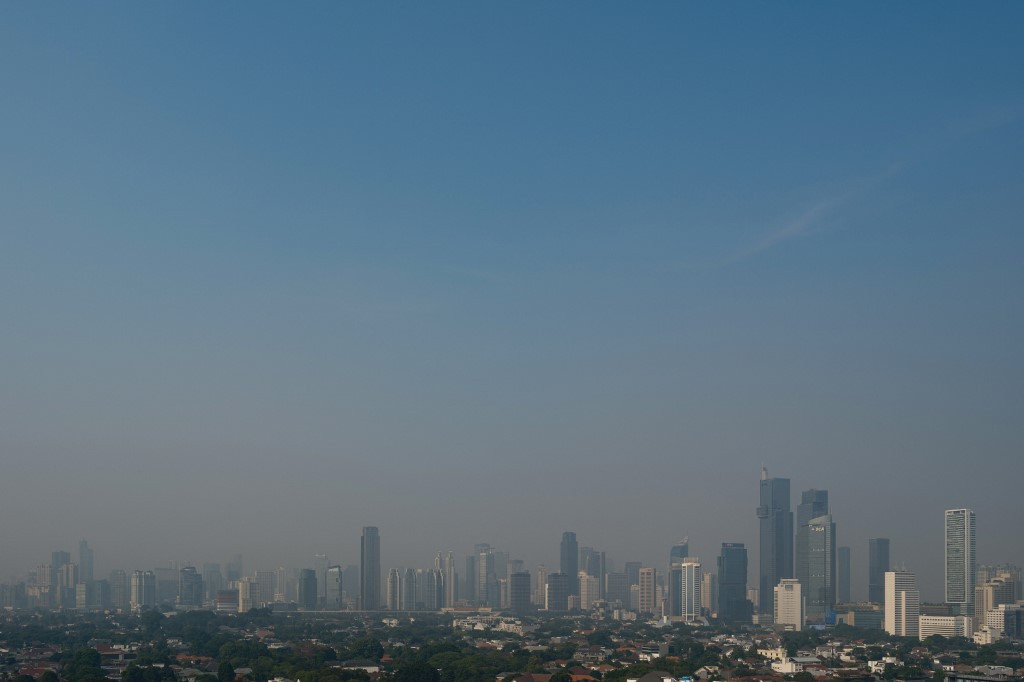Popular Reads
Top Results
Can't find what you're looking for?
View all search resultsPopular Reads
Top Results
Can't find what you're looking for?
View all search resultsCutting pollution sources
Comprehensive solutions that are sustainable for the long term are what Jakarta, and the country as a whole, needs to guarantee the human right to a clean and healthy environment, not a stopgap solution ahead of a major international summit.
Change text size
Gift Premium Articles
to Anyone
W
eeks have gone by as the government works left and right to solve Jakarta’s choking air pollution. Yet the problem seems to be worsening instead of improving.
Two and a half weeks after President Joko “Jokowi” Widodo ordered measures to curb Jakarta’s pollution, the quality of the air above the capital is showing little sign of changing. The air quality index (AQI) on Aug. 14, the day of the President’s meeting, reached the alarming “unhealthy” level of 152, according to Swiss tech company IQAir. Instead of improving, the AQI for Jakarta had deteriorated to 161, still in the same “unhealthy” category, by Wednesday afternoon.
The “good” AQI ranges from 0 to 50, followed by “moderate” at 51-100, “unhealthy for sensitive groups” at 101-150, and then “unhealthy” at 151-200. There are two more levels: “very unhealthy” (201-300) and beyond 300 is “hazardous”.
Even in 2020, during the public activity restrictions in the early months of the COVID-19 pandemic, Jakarta’s air quality was in the “unhealthy for sensitive groups” range.
Both the government and the Jakarta administration have been scrambling to reduce the pollution, which has apparently left the President himself feeling ill, as the city readies for next week’s ASEAN Summit. Their efforts have ranged from remote working to cloud seeding. Authorities have also named suspects of open burning and closed small businesses for allegedly burning toxic waste, to show that the government is serious about combating air pollution.
But these are mere short-term solutions aimed at saving the country’s face when we host ASEAN leaders and dialogue partners next week.
We must go beyond the ASEAN Summit and other high-profile meetings. We need comprehensive solutions to ensure that everybody can breathe fresh, healthy air: a human right that the government has so far neglected.
Such a bold endeavor, however, requires identifying and acknowledging the biggest sources of Jakarta’s pollution. The answer has been disputed, especially between the government and environmentalists, but even the environment minister has agreed that the two main sources are the transportation and energy sectors, with the latter referring to the coal-fired power plants located around the capital.
Meanwhile, the Transportation Minister and the Coordinating Maritime Affairs and Investment Minister have been persuading people to switch from fossil fuel vehicles to electric vehicles (EVs) as a solution. They have even offered subsidies to anyone purchasing an EV, ignoring the fact that increased demand for charging batteries will only push power plants to burn more coal to generate more electricity.
It will be wiser for the government to prioritize subsidies and other incentives for developing public transit, especially electric transportation. The government may have invested a lot in public transportation already, but it has been insufficient to provide safe and convenient transit services to the people in Greater Jakarta, let alone in other cities.
The government can reallocate its budget for EV purchases and fuel subsidies to operate more Commuter Line trains, expand the Jakarta MRT network and procure more electric buses.
After all, we can’t eat the toll road, right, Mr. President?
More importantly, Indonesia must fulfill its vow to phase out coal and transition to clean energy. Jakarta is surrounded by 16 coal power plants spewing pollutants that are carried on both easterly and westerly winds. There might be no other choice but to retire some, if not all, of them to free the city of pollution.
Yes, the energy transition is costly. That is why Indonesia needs to be more serious about getting its hands on the foreign funds it needs to shift away from coal. Inking the Just Energy Transition Partnership (JETP) might be a good start, but perhaps it’s prescient to also explore other foreign funding sources.
It is vital that the government works swiftly on potential long-term solutions because the longer it procrastinates, more lives will be exposed to the health hazards of air pollution.










